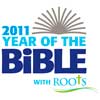To mark the Year of the Bible in 2011, Arnold Browne, a New Testament scholar, describes the origins of some New Testament writings as the first generation of Jesus' followers sought to make sense of his life, death and resurrection in the context of the Hebrew Scriptures with which they had been raised.
Wonderful deeds
The Christian Church began when a group proclaimed good news of what had happened and continued to happen.  Peter's speech at Pentecost (Acts 2.14-42) refers to Jesus' wonderful deeds, to his crucifixion and resurrection foretold in the Jewish Scriptures, and to the Holy Spirit, who will continue God's transforming work in the baptised.
Peter's speech at Pentecost (Acts 2.14-42) refers to Jesus' wonderful deeds, to his crucifixion and resurrection foretold in the Jewish Scriptures, and to the Holy Spirit, who will continue God's transforming work in the baptised.
Paul reminds the Corinthian church of the good news that he had handed on: 'that Christ died for our sins in accordance with the scriptures, and that he was buried, and that he was raised on the third day in accordance with the scriptures, and that he appeared to Cephas and the twelve' (1 Corinthians 15.3-5). Paul himself has been transformed by his encounter with the risen Christ, 'by the grace of God I am what I am' (15.10), and tells the Corinthians that 'you also are being saved, if you hold firmly to the message that I proclaimed to you' (15.2).
Witness
The New Testament is the testimony of the first generation of Christians to receiving and proclaiming the gospel. We find four accounts of Jesus' life and teaching, all the more compelling for reflecting his differing impact in diverse circumstances. Matthew reflects the concerns of Jewish Christians who see Jesus as a new Moses, preaching on another mountain that their righteousness should exceed 'that of the scribes and Pharisees' (Matthew 5.20). John relates to a time when Christians were painfully separating from the Jewish community.
The central emphasis is on the crucifixion and resurrection of Jesus, with a searching of the Jewish scriptures for their witness to his dying and rising. Peter's speech in Acts 2 says that in Psalm 16.8-11 'David spoke of the resurrection of the Christ' (2.31), and other authors find the resurrection foreshadowed in Jonah's three days in the whale (Jonah 1.17, Matthew 12.40) and Hosea's prophecy that 'on the third day the Lord will raise us up' (Hosea 6.2, Luke 24.7). Alongside the use of texts is the conviction that the whole Old Testament witnesses to God's power to bring life from death, renewing hope in the depths of despair. And so we are told that on the road to Emmaus the risen Jesus, 'beginning with Moses and all the prophets', 'was opening the scriptures to us' (Luke 24.27,32). Paul therefore says of Jesus: 'For in him every one of God's promises is a "Yes". For this reason it is through him that we say the "Amen" to the glory of God' (2 Corinthians 1.20).
I believe
The New Testament records the many ways in which the first Christians said their 'Amen' to the message of Jesus, in worship and in their lives. The way Matthew records Peter's confession (Matthew 16.16), or John the testimony of the man born blind (John 9.38), echoes early affirmations of faith, such as 'Jesus Christ is Lord' (Philippians 2.11) or 'I believe that Jesus Christ is the Son of God' (Acts 8.37, omitted from some versions but included by 'ancient authorities'). Jesus himself was faithful to the God of Israel: 'Worship the Lord your God, and serve only him' (Deuteronomy 6.13, Luke 4.8), and in the psalms Jesus' followers found testimony to him as the ideal leader (Peter quotes Psalm 110.1, in Acts 2.34-35) and as the ideal of humanity made in God's image (Psalms 8 and 22 used in Hebrews 2.5-18). And, says Paul, 'all of us … are being transformed into the same image' (2 Corinthians 3.18).
Reading aloud
From the beginning the New Testament letters were read aloud to those gathered for worship (see 1 Corinthians 16.21-24, Colossians 4.16, Hebrews 13.20-25, 1 Peter 5.12-14). Justin Martyr, writing around 155 AD (Apology 1.67), tells us that the prophets and the gospels were also read in worship. For the generations following the first Christians, the collection and use of the books of the Bible was essential to the proclamation of the gospel of Jesus, recognising that it fulfilled the purposes of the God of Israel.
The Nicene Creed also affirms that the Bible is life-giving, since Jesus 'rose again in accordance with the scriptures'. And as together we make our connections between the Old Testament, the New Testament, and our own different experiences of the presence and power of God, we will follow that first generation of Christians who found in Jesus 'the Author of life, whom God raised from the dead' (Acts 3.15).
You are welcome to reproduce this article within your church or organisation.
Please ensure that the copyright line 'This resource is taken from www.rootsontheweb.com and is copyright © ROOTS for Churches Ltd 2011.' is included.
 Go to index of all
Go to index of all
Year of the Bible 2011 material